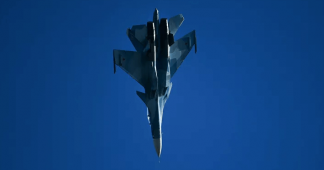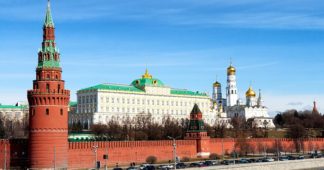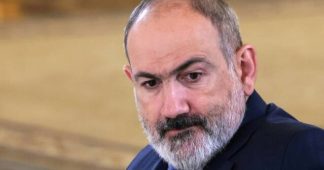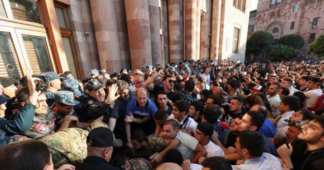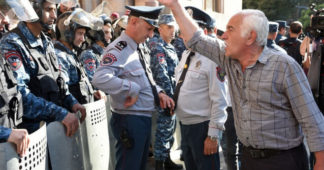Dec 30, 2023
Armenian Prime Minister Nikol Pashinyan claimed earlier that Moscow’s peacekeeping mission in Nagorno-Karabakh had “failed” and that Russia was “leaving” the South Caucasus. This prompted the Kremlin to note that “Russia is an absolutely integral part of this region, so it cannot go anywhere.”
Amid the NATO-led proxy war against Russia in Ukraine, the United States is considering using the South Caucasus as a springboard for opening a “second front” against Moscow, Deputy Russian Foreign Minister Mikhail Galuzin said in an interview with Sputnik.
Washington has long made no secret of its plans regarding Armenia, Georgia and Azerbaijan, he said, adding that “all this fundamentally contradicts the genuine interests of the people of the region.”
After Russia launched its special military operation in Ukraine in February 2022, the West’s pressure on Russia’s neighbors, allies, and partners has dramatically escalated. Thus, Washington has been muddying the waters between Moscow and Yerevan, especially in the wake of the recent Nagorno-Karabakh flare-up.
In September 2023, Azerbaijan took control over Nagorno-Karabakh in a lightning offensive, prompting almost all local residents to flee to Armenia. Over 100,000 people of Nagorno-Karabakh’s estimated 120,000 Armenian population had left the region by the end of September. The Nagorno-Karabakh authorities declared that the unrecognized state would cease to exist on January 1, 2024.
During the flare-up of Karabakh tensions, senior US officials, including the chief of the US Agency for International Development (USAID), Samantha Power, and Yuri Kim, acting assistant secretary of state for Europe and Eurasian affairs, were quick to converge on Armenia’s capital Yerevan to “affirm US support for Armenia’s sovereignty, independence, territorial integrity and democracy.” The Armenian Defense Ministry announced in September it would carry out joint military exercises with the US, dubbed “Eagle Partner 2023,” that would involve “stabilization tasks between conflicting parties during the peacekeeping mission.” Yerevan also signaled readiness to continue cooperation with NATO within the Individual Partnership Action Plan (IPAP), while Armenian Prime Minister Nikol Pashinyan, in an interview with Italian outlet La Repubblica, claimed Russia’s peacekeeping mission in Nagorno-Karabakh had “failed,” and that Russia was “leaving” the South Caucasus.
In response, the Kremlin underscored that “Russia is an absolutely integral part of this region, so it cannot go anywhere,” with Kremlin spokesman Dmitry Peskov emphasizing that the US-Armenian drills caused concern, “especially in the current situation.”
Earlier in the year, Russian Foreign Ministry spokeswoman Maria Zakharova noted that Armenia has been demonstrating its intention to radically “reorient” its foreign policy.
“In my opinion, this is being done clearly at the suggestion or prompting of the West,” Zakharova said at a briefing in November. Commenting on a statement by Secretary of Armenia’s Security Council Armen Grigoryan, who said that Armenia “is not aware of Moscow’s proposals” on a peace treaty between Yerevan and Baku, as well as the delivery of military equipment such as Bastion armored personnel carriers to the country by France, Zakharova said that “Yerevan appears eager to negotiate a peace treaty in Washington, Brussels, although neither the US nor the EU can be considered bona fide intermediaries for a variety of reasons.” The Russian Foreign Ministry spokeswoman emphasized that the actions of the United States and the European Union were aimed at “ousting Russia from the South Caucasus.”
“They want to destroy the existing security mechanisms in the region, while brazenly altering the trilateral agreements reached with the participation of Moscow to suit opportunistic considerations. There cannot be any real benefit from their mediation,” Zakharova pointed out.
She added that “Yerevan’s reckless bet that the West will help them has failed.”
“It’s impossible not to see this. Despite the existing invitations, negotiations on a peace treaty are still frozen… Of course, discussions about the benefits of supplying French Bastion armored vehicles to Armenia look quite naive,” she concluded.
In November, Prime Minister Nikol Pashinyan said Armenia had negotiated the basic principles of a future peace agreement with Azerbaijan, but Baku had not yet confirmed its commitment to the three principles proposed by Yerevan.
“The basic peace principles have been agreed with Azerbaijan. This happened as a result of my meetings in Brussels with Azerbaijani President [Ilham Aliyev] mediated by European Council President Charles Michel,” Pashinyan said. Yerevan and Baku started discussing a future peace deal in 2022 with the mediation of Russia, the European Union, and the United States.
We remind our readers that publication of articles on our site does not mean that we agree with what is written. Our policy is to publish anything which we consider of interest, so as to assist our readers in forming their opinions. Sometimes we even publish articles with which we totally disagree, since we believe it is important for our readers to be informed on as wide a spectrum of views as possible.
